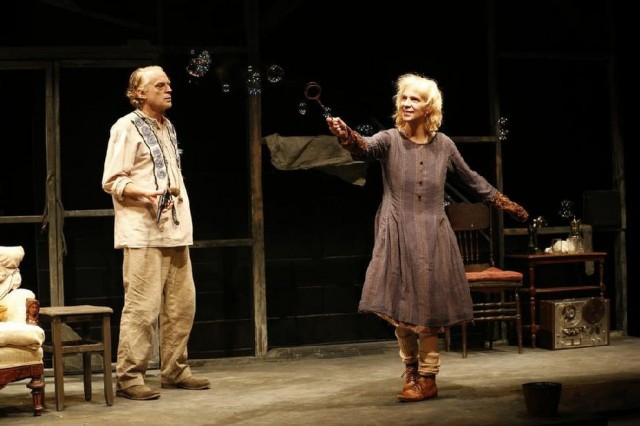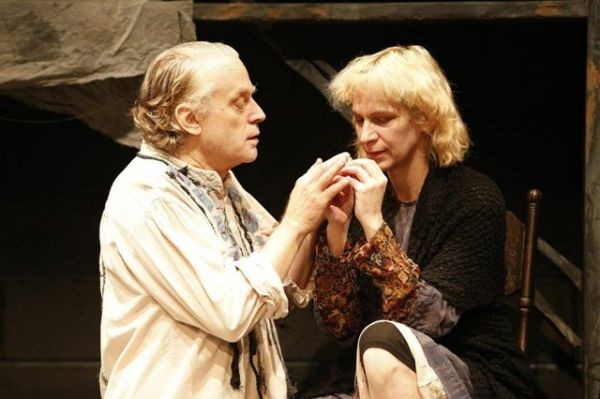
Felice (Brad Dourif) and Clare (Amanda Plummer) intermingle fantasy and reality in Tennessee Williams’s THE TWO-CHARACTER PLAY (photo by Carol Rosegg)
New World Stages
340 West 50th St. between Eighth & Ninth Aves.
Wednesday – Monday through September 29, $72.50-$92.50
www.thetwocharacterplay.com
www.newworldstages.com
Former home to a low-priced, second-run movie theater, New World Stages primarily presents spectacle productions and award-winning musicals that have left Broadway; its current roster includes Peter and the Starcatcher, Avenue Q, Gazillion Bubble Show, and iLuminate: Artist of Light. But occupying its fifth stage is something very different, a thrilling version of one of Tennessee Williams’s lesser-known later works, The Two-Character Play. Williams might be considered one of the greatest playwrights of the twentieth century, both a critical and popular favorite, but his name is not usually associated with such cutting-edge experimental dramatists as Pirandello, Pinter, Brecht, and Beckett. Yet The Two-Character Play (produced in various versions over the years, sometimes titled Out Cry) is just that, a surreal, highly intellectual, and wonderfully unpredictable self-referential story about theater itself and, more abstractly, Williams’s life and career. Brother and sister Felice (Brad Dourif) and Clare (Amanda Plummer) are in a dilapidated theater, having been abandoned by the rest of their acting troupe. The pair is getting ready to perform The Two-Character Play, but there are problems with the unfinished set, props, and costumes, as they have run out of money. They can’t even afford a place to stay, so the theater, appropriately enough, has become their home. Over the course of two hours, Felice and Clare seamlessly glide between the play and the play-within-a-play, blurring the line between fantasy and reality, fact and fiction, as the events of the play directly relate to the events in their personal lives, becoming one and the same. The major exception is that in the play-within-the play, Clare can suddenly cut scenes and move the story ahead by hitting a key on a piano, infuriating Felice, who does not want to see his work edited so brazenly. Things are further complicated in that both Felice and Clare just might be certifiably insane, which only adds to the bittersweet confusion while also relating to Williams’s beloved sister and muse, Rose, who spent most of her life in an institution. Meanwhile, Felice may or may not be breaking the fourth wall, as he peers through imaginary curtains at the actual, seated audience while talking about them as if they are still filtering in.

Brother and sister battle sanity and the theater itself in dazzling revival of late Williams experimental drama (photo by Carol Rosegg)
Evoking Pirandello’s absurdist classic Six Characters in Search of an Author, Williams makes the production of the play-within-the-play the central focus, as Felice and Clare appear to be otherwise trapped in the theater (referencing Williams’s three-month confinement in a hospital in 1969), unable to leave to take care of personal business involving the owner of Grossman’s Market and a potential settlement from the Acme Insurance Company. As darkness continues to envelop both them and the characters they are playing, the only brightness comes from an enormous sunflower hovering over them in the background, but it is not necessarily a sign that positive things await. Dourif (One Flew over the Cuckoo’s Nest, Deadwood) and Plummer (Agnes of God, Pulp Fiction) are marvelous together, delivering intimate, intricate performances in which every breath, sound, and movement is filled with meaning. Director Gene David Kirk (Boy Meets Boy, Real Babies Don’t Cry) does an excellent job of integrating the dual stories while incorporating the third part of the play, involving the actual audience watching the production. After all, the crowd has come to see Tennessee Williams’s multilayered The Two-Character Play, which is about two characters putting on a show called The Two-Character Play. In the play’s original program notes, Williams wrote, “To be effective in the theater now existing, the two performers, who must be very gifted whether they are ‘stars’ or not, must relieve the dark content of the plays, interior and total, with a carefully measured lightness — the jokes of the condemned? — and of course by that virtuousity of performance that very gifted performers always bring to a difficult work. This is a play that has to seek out its kind with great care, since it is as vulnerable as Clare and Felice, and as deviant.” This production, which continues through September 29 at New World Stages, is all that and more, a compelling and intriguing melding of care, virtuosity, vulnerability, and deviance, performed by two immensely gifted actors.